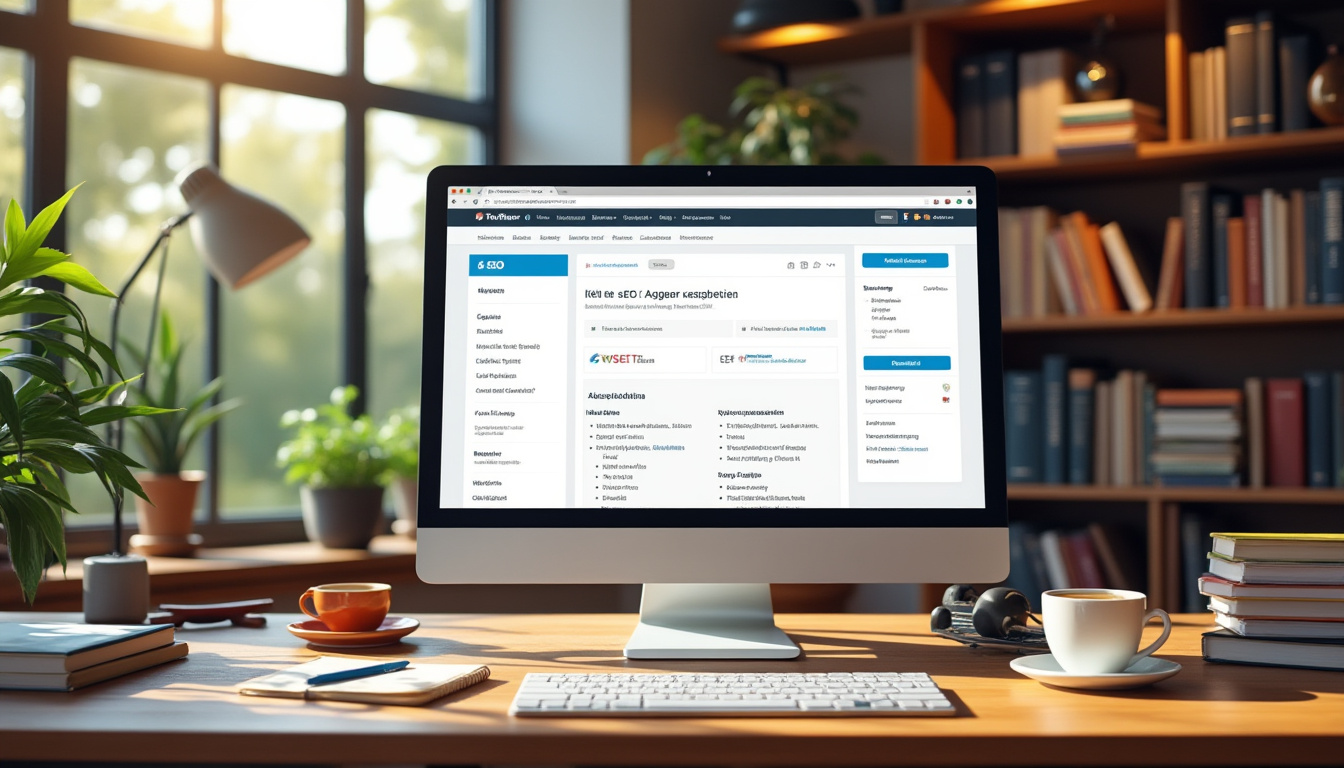Understanding the URL structure is crucial for optimizing WordPress SEO. A well-organized URL system can enhance search engine rankings and make it easier for search engines to crawl your website. Utilizing SEO-friendly URLs, which typically feature relevant keywords and concise formats, can improve search visibility. Furthermore, a logical structure allows both users and search engines to interpret the content of your pages effectively. Implementing best practices for permalinks and avoiding complex parameters are vital steps in refining your site’s overall SEO performance.
URL structure plays a fundamental role in enhancing the SEO performance of a website built on WordPress. It not only aids search engines in indexing content but also contributes to providing a better user experience. In this article, we will delve into what an SEO-friendly URL structure is, how it can influence website rankings, and effective practices that can be implemented on your WordPress site.
What is URL Structure?
A URL (Uniform Resource Locator) is the address of a resource on the internet. It functions as a pathway, guiding users and search engines to specific pages on your website. The structure of a URL is essential, as it comprises various components, including the protocol, domain name, path, and parameters. When structured properly, URLs provide crucial context about the content of the pages, making it easier for both users and search engines to understand.
The Importance of URLs in SEO
In the realm of SEO, URLs serve several vital functions. They allow search engines to crawl and index your website, and URLs that include relevant keywords can improve visibility in search results. Moreover, well-structured URLs are more likely to attract clicks from users, thereby enhancing user engagement and potentially improving rankings.
Impact on Crawling and Indexing
Search engines utilize bots and crawlers to discover and index web pages. A logical and clear URL structure facilitates a smoother crawling process, allowing search engines to efficiently index your content. According to a study, well-structured URLs are easier for search engines to understand, which can help improve the ranking of those pages.
Improving User Experience
A concise and descriptive URL can also enhance user experience. Visitors are more likely to click on links that they can easily comprehend. For instance, a URL that clearly indicates the content of the page will facilitate users in deciding whether to click on it or not. Improved user experience can lead to lower bounce rates and higher dwell times, ultimately benefiting your SEO efforts.
Best Practices for Creating SEO-Friendly URLs
To maximize the benefits of your URL structure for SEO, implementing certain best practices is essential. Here are some tips on how to create SEO-friendly URLs in WordPress:
Utilize Keywords
Incorporating relevant keywords into your URLs is a powerful strategy for improving visibility. URLs that include keywords are easily recognizable to both search engines and users. For instance, a URL like www.example.com/seo-tips will perform better than www.example.com/page1.
Keep It Short and Simple
Less is often more when it comes to URL structure. Shorter URLs are easier to read and share. Additionally, they reduce the risk of truncation in search results. Aim for URLs that are concise while still conveying the page’s content as accurately as possible.
Avoid Unnecessary Parameters
While some parameters can be useful for tracking or dynamic content, excessive and unnecessary parameters can complicate your URL structure and hinder SEO performance. Strive to simplify your URL design by removing unnecessary elements.
Permalinks in WordPress
In WordPress, permalinks dictate the format of your URLs. Choosing the right permalink structure is crucial for optimizing your website’s SEO. The default setting in WordPress may include parameters that aren’t beneficial for SEO. It’s advisable to update your permalink settings to utilize a structure that highlights the relevant keywords of your pages.
Recommended Permalink Structures
The best permalink structure for SEO typically includes the post name. An example would be www.example.com/sample-post. This format allows search engines and users to easily understand the post’s topic. Additionally, many SEO experts recommend avoiding using dates or numeric identifiers, as they can quickly render content outdated.
The Role of URL Hierarchy
The hierarchy of your URL structure can influence its effectiveness. A well-organized URL hierarchy creates a logical navigation path within your website. For instance, a URL like www.example.com/category/subcategory/topic not only helps in clear navigation but also in establishing relevancy to associated content, improving overall SEO.
Categories and Subcategories
Define categories and subcategories for your content. This way, you can create URLs that reflect this organization. Maintaining a clear hierarchy of categories in your URLs can further enhance search engine understanding and user navigation.
SEO Impact of URL Changes
Modifying your URL structure can significantly impact your SEO results. Changing URLs without proper management can lead to lost traffic and a decline in your site’s ranking. If you must change a URL, consider implementing 301 redirects to guide users and search engines from the old URL to the new one seamlessly.
Monitoring URL Changes
After making any changes to your URL structure, it is essential to monitor the effects on your SEO performance. Tools like Google Search Console can help track URL performance, detect crawl errors, and ensure that your changes are not adversely affecting your website’s visibility.
Evaluating URL Structure with Analytics
You can leverage analytics tools to assess how your URL structure influences your website’s performance. Monitoring metrics such as organic traffic, bounce rates, and the number of links to your URLs can provide insights into how effective your URL structure is for SEO.
Using Google Search Console
Google Search Console can offer valuable information about how your URLs are indexed and rank. You can also identify any issues with your URLs, such as crawl errors, which provide vital insights for improving your SEO strategy.
Additional Resources for URL Optimization
To further understand how to optimize your URL structure efficiently, you may find these resources helpful:
- Comprehensive Guide to SEO for WordPress
- Understanding URL Structure and SEO Impact
- How to Optimize URLs for Search
- Understanding Keywords in WordPress SEO
- Improving Website Speed for Better SEO
- URL Structure Analysis and Impact
- Optimizing Images for SEO in WordPress
- Best WordPress Permalink Structure for SEO
- Impact of URL Structure in SEO
- How to Optimize Your WordPress Site for Better SEO Performance
Effective URL structure is vital for enhancing your WordPress website’s SEO performance. By following best practices, utilizing the right permalink structure, and staying mindful of how you manage your URLs, you can significantly improve your website’s visibility, gain better rankings, and provide a seamless user experience.

The way URLs are structured on your WordPress site can significantly affect your search engine optimization (SEO) efforts. A well-crafted SEO-friendly URL structure not only enhances user experience but also assists search engines in understanding your content better. This article will delve into the implications of URL structures on WordPress SEO, exploring best practices and key factors that influence site visibility and rankings.
What is URL Structure?
A URL (Uniform Resource Locator) is a web address that directs visitors to a specific resource on the internet. Each element of the URL, from the domain name to the specifics in the path, plays a role in how search engines index and understand the page’s content. Understanding how these components work together is crucial for optimizing your site effectively.
Impact of URL Structure on SEO
The impact of URL structure on SEO cannot be underestimated. URLs that include relevant keywords help search engines identify the main topics of a page. For instance, using descriptive slugs—parts of the URL that follow the domain—can increase the chances of higher rankings. It’s essential for URLs to be concise, meaningful, and free of unnecessary parameters or symbols, as search engines often prefer shorter, clearer URLs for better indexing.
Best Practices for SEO-Friendly URLs
To optimize your URL structure, follow some best practices. Start by ensuring your URL is readable for both users and search engines. Avoid using special characters, and instead, stick to hyphens to separate words. You can read more about creating SEO-friendly URLs here.
Utilizing Permalink Structures
In WordPress, the setting of permalinks is vital. This defines how URLs are generated for your posts and pages. Choosing a generic format like “Post Name” tends to be the most effective for SEO. This structure is descriptive and helps search engines grasp the content’s context easily, which can lead to increased visibility on search engine results pages. Check the best practices for permalinks for further insights.
Common Mistakes to Avoid
There are common pitfalls when it comes to URL structuring that can hinder your SEO strategy. Use caution with parameters that can dilute your content’s relevance, as excessive use of URL parameters can complicate crawling and indexing. Additionally, avoid changing URLs frequently, as this can break existing links and affect your rankings. You may explore the implications of URL parameters for more understanding.
The Role of URL Structure in User Experience
A clear and well-structured URL enhances user experience. When users see a URL that is easy to read and signifies the content, they are more likely to click on it. A positive experience encourages user engagement and decreases bounce rates, both of which are crucial factors in SEO success. Consider analyzing your URL structures to ensure they reflect clarity and relevance for your audience. Learn more about how to create an effective URL structure.
How to Analyze and Improve URL Structures
Regularly reviewing your URL structures can help enhance your website’s SEO performance. Tools and plugins often enable you to analyze and optimize your existing URLs systematically. If you notice patterns of poor performance, pivoting your approach based on clear data can lead to significant improvements. For guidance on repairing plugin conflicts or enhancing site speed for SEO, visit this link and learn how to optimize your site speed for better results.
Implementing a thoughtful URL structure in WordPress is foundational for effective SEO. Understanding how URLs influence both search engine performance and user experience is critical in the digital landscape, and adhering to best practices can guide you towards higher visibility and improved rankings. For a more comprehensive understanding of SEO best practices tailored for WordPress, feel free to explore this extensive guide.
| Aspect | Impact on SEO |
| Keyword Inclusion | Incorporating keywords in URLs enhances search visibility. |
| URL Length | Shorter URLs are preferred as they are easier to read and share. |
| Readability | Clear, descriptive URLs improve user experience and click-through rates. |
| Permalink Structure | Optimized permalinks help search engines understand content relevance. |
| Hyphen Usage | Using hyphens instead of underscores aids in keyword separation. |
| Dynamic Parameters | Avoid complex parameters to ensure better indexing by search engines. |
| Consistency | Maintaining a consistent URL structure enhances site organization. |
Understanding the Importance of URL Structures in WordPress SEO
Optimizing your website’s URL structure is essential for improving its visibility and search engine rankings. A well-structured URL not only enhances the user experience but also plays a significant role in how search engines understand and index your content. This article explores the key aspects of URL structures and provides recommendations for optimizing them specifically for WordPress.
What Constitutes a Good URL Structure?
A good URL structure is characterized by clarity, relevance, and brevity. URLs should be easy to read and understand, both for users and search engines. For instance, a URL like www.example.com/seo-tips is more informative and preferable than www.example.com/?p=123. Utilizing descriptive keywords in your URLs can help convey the page’s content effectively.
Why Keywords Matter
Incorporating relevant keywords in your URLs can improve your site’s search visibility. Search engines use these keywords as indicators of the content within the page. Ensure that your URLs accurately reflect the subject matter, which can significantly contribute to better rankings in search results.
Best Practices for URL Structure in WordPress
When optimizing your WordPress site, consider the following best practices for creating SEO-friendly URLs:
- Use Permalinks: WordPress allows you to set a permalink structure that dictates how your URLs appear. Choose a format that includes keywords and is easy to read, such as the Post name option.
- Avoid Special Characters: Special characters and unnecessary numbers in URLs can create confusion, both for users and search engines. Stick to simple, clean formats that primarily use letters, numbers, and hyphens.
- Limit Word Count: Aim to keep URLs as short as possible while still being descriptive. Generally, keeping URLs under 60 characters helps make them more user-friendly.
The Role of URL Structure in Search Engine Rankings
Search engines prioritize well-structured URLs during the crawling process. Clean and descriptive URLs make it easier for search engines to understand the content of a page, which can lead to improved rankings. A logical URL hierarchy can also enhance user engagement, as visitors are more likely to trust and click on URLs that are straightforward and relevant.
Impact on User Experience
A user-friendly URL structure enhances the overall experience for visitors. When users can predict the content of a page just by looking at the URL, they’re more inclined to click through. This can lead to better click-through rates (CTR) and potentially lower bounce rates, both of which are favorable signals to search engines.
Common Mistakes to Avoid
Avoiding common missteps is equally important when it comes to URL structure. Here are a few pitfalls to sidestep:
- Changing URLs Frequently: Altering URLs can lead to broken links and a drop in rankings. If changes are necessary, ensure you set up proper redirects.
- Overloading with Keywords: While it’s beneficial to use keywords, stuffing URLs with too many may come off as spammy. Focus on one or two relevant keywords for the best impact.
- Ignoring HTTP Status Codes: Make sure your URLs return the correct HTTP status codes. For instance, 404 errors can harm your SEO efforts significantly.
Frequently Asked Questions about URL Structure’s Impact on WordPress SEO
What is a URL and why is it important for SEO? A URL, or Uniform Resource Locator, serves as the web address for a specific page. It is essential for SEO because it helps search engines understand the content of a page, which can influence ranking in search results.
How does URL structure affect SEO rankings? A well-structured URL can improve a website’s rankings by making it easier for search engines to crawl and index pages. Short, descriptive URLs with relevant keywords tend to perform better in search engine results.
What are the best practices for creating SEO-friendly URLs? SEO-friendly URLs should be short, include relevant keywords, and use hyphens to separate words. Avoid using special characters or excessive parameters, as these can complicate the URL and reduce its effectiveness.
Does using keywords in URLs boost SEO performance? Yes, incorporating relevant keywords within a URL can enhance search visibility and help search engines categorize your content accurately.
What is the recommended permalink structure in WordPress for SEO? The best practice for permalink structure in WordPress is to use the ‘Post name’ option, which creates clean and keyword-rich URLs that reflect the content of the page.
How can URL changes impact SEO? Changing a URL can impact SEO if not handled correctly. It is crucial to set up 301 redirects from the old URL to the new one to preserve SEO equity and prevent broken links.
What role do URL parameters play in SEO? URL parameters can complicate the structure of a URL and may lead to duplicate content issues. It’s best to keep URLs clean and limit the use of parameters for optimal SEO performance.
How do search engines perceive short vs. long URLs? Search engines generally prefer short URLs as they are easier to read and understand. Longer URLs can dilute the relevance and make it harder for users to remember the link.









